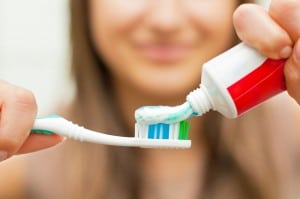Brushing your teeth is a vital step in keeping healthy teeth and gums. However, brushing your teeth too often or too hard can be harmful for your mouth. Over-brushing can lead to receding gums and sensitive teeth.
Brushing too often and too hard wears down the enamel on teeth as well as push back or damage gums. This means that teeth can appear to be turning clear and/or the roots of the teeth can become exposed. Receding gums are extremely dangerous to your oral health. Exposed roots can cause periodontal disease, or gum disease, as well as cause cavities in the root of the tooth. If you have cavities in the root of one of your teeth, it can lead to the need for root canals, fillings or even tooth extraction.

Who Is More At Risk
Those who are most at risk of gum recession and sensitive teeth usually do not even know it! The type of toothbrush you use can be a big factor in whether or not your gums recede. Toothbrushes with medium to hard bristles are usually a large cause of gum recession. The harder bristles are harsh on your gums and can push gums back more easily than a softer bristle toothbrush.
Genetics also can be a large factor in whether or not someone has gum recession. Receding gums is actually a gene that can become prominent in many families. Educating yourself about your family medical and dental history can help keep you from developing a gum recession issue.
Gum recession is also prominent with those who clench or grind their teeth often. If you have had your teeth straightened by braces, you may also be at risk.
All of these factors can increase your risk of the issues associated with over brushing, so how can you keep yourself from over brushing?
Changing Your Brushing Habits
Changing your oral health care habits is easy and can help keep your gums healthy and stop gum recession in it’s tracks or from getting any worse. So how can you do this?
Changing the type of toothbrush that you use is the first step that you can take. Switching from a harder bristled toothbrush can be difficult for those who are accustomed to using them. Though it may be a difficult swap, it is important that you switch to a softer toothbrush. Softer toothbrushes can prevent gum damage and keep enamel from wearing off.
When brushing, avoid repetitive saw-like motions over the teeth. Shorter, scrub-like strokes are better for gum health.
When brushing, try and keep your toothbrush at a 45 degree angle to keep yourself from putting too much pressure on the gum-line. Also, do not apply too much pressure at all when brushing your teeth. If your toothbrush head looks squashed or the bristles are sticking out in all, different directions, there is a problem there. Try and brush with less force, it can be the difference between gum recession and healthy gums.
If you have any other questions about gum health, brushing habits, or any other dentistry questions, contact The Lakeway Center For Cosmetic and Family Dentistry today! Our office is located in the Lakeway area and can be reached at 512-568-3072.
